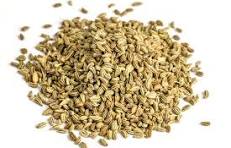
Carom seeds, popularly known as ajwain in India, are small, oval-shaped seeds with a strong, thyme-like aroma. While often used as a spice in Indian cooking, carom seeds are also known for their impressive health benefits and medicinal properties. In this blog, we’ll explore everything you need to know about carom seeds — from their origins and nutritional value to their uses and side effects.
What Are Carom Seeds?
Carom seeds come from the Trachyspermum ammi plant, which belongs to the Apiaceae family — the same as parsley, cumin, and dill. Though they look similar to cumin seeds, they have a much stronger taste and aroma, thanks to the presence of thymol — a compound with antiseptic and antibacterial properties.
Nutritional Value of Carom Seeds (per 100g)
- Calories: 305
- Carbohydrates: 43g
- Protein: 16g
- Fat: 25g
- Fiber: 39g
- Calcium: 1,600 mg
- Iron: 13.7 mg
- Thymol: 2–5%
Note: While carom seeds are rarely consumed in large quantities, they are nutrient-dense and contain several essential minerals.
Health Benefits of Carom Seeds
1. Aids Digestion
Ajwain is best known for its digestive benefits. It helps relieve indigestion, bloating, gas, and acidity. Just chewing a few seeds or drinking ajwain water can provide quick relief.
2. Relieves Cold and Cough
Ajwain acts as a natural decongestant. Boiling the seeds in water and inhaling the steam can help relieve nasal congestion. Drinking ajwain tea may help soothe sore throat and cough.
3. Eases Menstrual Pain
Carom seed water can act as a muscle relaxant and reduce menstrual cramps. Drinking warm ajwain water during your period is a traditional home remedy.
4. Anti-inflammatory and Antibacterial Properties
Thanks to thymol, ajwain seeds help fight bacterial and fungal infections. They are also used in Ayurvedic treatments for arthritis and joint pain.
5. Weight Loss Support
Ajwain water is believed to boost metabolism and reduce water retention, making it popular in natural weight loss remedies.
How to Use Carom Seeds
- Cooking Spice: Commonly added to Indian dishes like parathas, pakoras, and dals.
- Ajwain Water: Soak 1 tsp in a glass of water overnight; strain and drink on an empty stomach.
- Ajwain Tea: Boil 1 tsp in water with ginger and honey for a soothing tea.
- Inhaling Steam: Add crushed seeds to boiling water and inhale to relieve congestion.
Possible Side Effects of Carom Seeds
While ajwain is safe in small quantities, excessive consumption may cause:
- Nausea or vomiting
- Heartburn (in sensitive individuals)
- Allergic reactions
- Interactions with medications (especially blood thinners)
Note: Pregnant or breastfeeding women should consult a doctor before taking ajwain medicinally.
FAQs About Carom Seeds
Q: Can I eat carom seeds daily?
Yes, but in moderation. 1/2 to 1 teaspoon per day is usually safe and beneficial.
Q: Is ajwain good for skin?
Yes, its antibacterial properties can help in treating acne and skin infections. Ajwain paste is used in some home remedies.
Q: Can ajwain water reduce belly fat?
It may support digestion and reduce bloating, which helps in weight management. However, it’s not a magic solution.
Q: Are carom seeds good for children?
In small doses, ajwain water is often given to babies for gas or colic, but always consult a pediatrician first.
Conclusion
Carom seeds are a tiny powerhouse of health benefits. Whether you’re looking to improve digestion, relieve a cold, or add flavor to your meals, ajwain is a valuable addition to your kitchen. Just remember — moderation is key, and when in doubt, seek medical advice.
Would you like me to add SEO-friendly keywords, meta description, or a Pinterest image title to go with this blog post?

